初中英语八大时态专项练习
初中八种英语时态精讲精练(含答案)

初中八种英语时态精讲精练一般现在时一、用法1.表示经常发生的动作、行为或存在的状态。
常用的时间状语有:often, usually, always, every day/week/month/year, sometimes, seldom,once a week, twice a week, on Sundays等。
I go to school every day.2.表示主语的身份或特征。
His father is a doctor. Tom is tall.3.表示一种客观事实或普遍真理。
The earth is round. The sun is bigger than the moon. 4.在条件状态从句和时间状语从句中,用一般现在时表示将来。
If you don’t go soon, you’ll be late. 如果你不快去的话,你就要迟到了。
二、构成动词一般现在时,除主语为单数第三人称以外,谓语动词一律用原形,若主语为第三人称单数,则谓语动词的词尾应发生变化(加-s或-es)。
1.在动词原形后加-s run→ runs2.以ch, sh, s, o, x结尾的动词后加-es guesses, fixes, teaches, washes, goes3.以辅音字母+y结尾的动词,先将y变为i,再加-es try→ tries4.以元音字母+y结尾的动词后加-s stay→ stays 5. have-has三、一般现在时的句型变化。
1. 肯定句(1)主语+ am / is / are +表语They are new students. I am tall. He is from Japan.am is are 用法口诀:I用am,you 用are,is 连着他、她、它;单数用is , 复数一律都用are。
(2)a. 主语+实义动词+其它I read English every morning.b. 单三人称主语+实义动词单三人称+其它He usually goes to school by bike.2. 否定句(1)主语+am / is / are + not +表语She is not a nurse.(2)a. 主语+don’t +动词原形+其它如:I don’t pla y soccer after school.b.单三人称主语+doesn’t +动词原形+其它He doesn’t go to the park after school.3. 一般疑问句(1)Am / Is / Are +主语+表语?Is your mother a teacher?(2)a. Do + 主语+动词原形+其它?Do you speak English?b. Does +单三人称主语+动词原形+其它?Does your brother have a wide mouth?4. 特殊疑问句特殊疑问词+一般疑问句?What time does your mother get up every day?专项练习题一、写出下列动词的第三人称单数形式1. study ________2. play ________3. watch _____4. wash _______5. have _______6. ride _______7. take _______8. worry_______9. help _______10. say ________11.put ________12. teach ________13. fly ________14. eat ________15. go _______16. guess ______17. read _______ 18. do _______19. call ________20. cry ________1-5 studies, plays, watches, washes, has 6-10. rides, takes, worries, helps, says 11-15 puts, teaches, flies, eats, goes 16-20 guesses, reads, does, calls, cries二、用所给动词的适当形式填空1. He often ______(have) dinner at home.2. Daniel and Tommy _____(be) in Class One.3. We _______(not watch) TV on Monday.4. Nick ______(not go) to the zoo on Sunday.5. _____ they ____(like) the World Cup?6. What ____they often ____(do) on Saturdays?7. _______ your parents _______(read) newspapers every day?8. The girl _______(teach) us English on Sundays.9. She and I ________(take) a walk together every evening.10. The moon ________ (travel) round the earth.11. It usually ________ (take) me more than two hours to finish my homework.12. I will tell him the good news as soon as he ________ (come) back.13. Miss Gao is very busy. She ________ (sleep) six hours a day.14. Look! Susan ________ (dance) in the garden. She often ________ (dance) there.15. The children will go to the Summer Palace if it ________ (not rain) tomorrow.16. I _________ any pears (not have). But Mary _________ some (have).17. What language ____ you _____? (speak) 18. My brother _____ to be a scientist. (not like) 19. We ______ Japanese at school. (not study) 20. He _____ playing football. (not like)1. has2. are3. don’t have4. doesn’t go5. Do like6. do, do7. Do, read8. teaches9. take 10. travels 11. takes 12. comes 13. sleeps 14. is dancing, dances 15. doesn’t rain 16. don’t have, has 17. do, speak 18. doesn’t like 19. don’t study 20. doesn’t like三、按照要求改写句子1. Daniel watches TV every evening.(改为否定句)_________________________2. I do my homework every day.(改为一般疑问句,并作肯、否定回答)________________________________________________________3. Amy likes playing computer games.(改为一般疑问句,并作肯、否定回答)___________________________________________________4. We go to school every morning.(改为否定句)____________________________5. Sun Yang usually washes some clothes on Saturday.否定句: _____________ 一般疑问句: ________________ 划线提问: ____________6. Tom does his homework at home.否定句: ______________ 一般疑问句: ____________ 划线提问_____________1. Daniel doesn’t watch TV every evening.2. Do you do your homework every day? Yes, I do. No, I don’t.3. Does Amy like playing computer games? Yes, she does. No, she doesn’t.4. We don’t go to school every morning.5. Sun Yang doesn’t usually wash any clothes on Saturday. Does Sun Yang usually wash any clothes on Saturday? What does Sun Yang usually do on Saturday?6. Tom doesn’t do his homework at home. Does Tom do his homework at home? Where does Tom do his homework?四、选用所给的词语适当形式填空give, rain, enjoy, sing, return, borrow, keep1. It often ______ in my hometown in summer.2. Sometimes the birds _______ in the tree.3. Joe usually ____ books from the school library, but she never _____ them on time.4. May I ________ the dictionary for a week?5. The little boy ________ himself in the garden on Saturdays.6. Mary is a good girl. She often ________ me a hand when I need some help.1. rains2. sing3. borrows, returns4. keep5. enjoys6. gives一般过去时的用法一、定义:表示过去某一时间所发生的动作或存在的状态;表示在过去一段时间内,经常性或习惯性的动作。
初中英语八大时态练习题(含答案)

初中英语八大时态练习题1.I will tell him as soon as he _____ backA. comeB. comesC. will comeD. came2. Mary _____ on shoes when she ____ them.A. tries…buysB. tries… buiesC. trys… buysD. trys… buies3. The girl often ______ cold when she ______.A. cathcsdancesB. catches dancesC. catchsdanceesD. catches dancee4. _____ he ____ himself there No, I don't think so.A. DoenjoyB. Does enjoiesC. Does enjoysD. Doesenjoy5. _____ your teacher ____ from them very often Certainly.A. DohearB. DoeshearC. Do receiveD. receive6. _____ your mother _____ some cleaning on SundaysA. DoesdoesB. DodoesC. DoesdoD. Do do7. _____ Tom _____to work hard to help his family Yes, he _____.A. Has xdoesB. HasxdoesC. DoeshashasD. Does havedoes8. Which teacher _____ lessons to you every dayA. does givesB. does giveC. do giveD. gives9. Smith does not go fishing on weekdays, ____ _____ , he does.A. does heNoB. does heYesC. doesn't heNoD. doesn't heYes10.Mr Black often _____ fishing on Sundays, _____ heA. goesdoesn'tB. goesisn'tC. doesn't godoesD. doesn't gois11.He usually _____ TV on Sunday evening.A. watchB. watchesC. watchingD. is watching12. We'll go to play with snow if it ______ tomorrow.A. snowB. snowsC. will snowD. snowed13. Neither I nor he ______ French.A. speakB. doesn't speakC. speaksD. doesn't speak14. Nobody ______ how to run this machines.A . know B. have known C. knows D. is knowing15. The Young Pioneer _____ water for the old man every day.A. carryB. bringC. takesD. carries16. Some are ______ in the river and some are ______ games.A. swimming playingB. swimmingplaiingC. swimming I playingD. swimmingplaing17. Look ! The boy students are _____ football while the girls are _____ .A. playing danceB. playing dancingC. play dancingD. play dance18. He _____ to do his lessons at eight every evening.A. is beginningB. is beginningC. beginD. begins19. _____ he _____ on well with his friends this termA. DoesgetsB. DoesgetC. IsgettingD. Isgeting20. Mr Smith _____ short stories, but he ____ a TV play these days.A. is writingis writingB. is writing writesC. writes is writingD. writes writes参考答案:1—5 BABDB 6—10 CDDBA 11—15 BBCCD 16—20 CBDCC21. I _____ to the cinema. I ______ there every Sunday.A. go…goB. am going… goC. go… am goingD. am going…am going22. Look, they______ a good time, ____ theyA. have…doB. have…don'tC. are having…areD. are having aren't23. You ______ about the future now, ______ youA. don't thinkdon'tB. aren't thinking aren'tC. don't think doD. aren't thinking are24. She always ______ something whenever she ______.A .studiedplayed B. studiedplaiedC.. studiedplaiedD. studied played25. He often _____ late in the forest. It _____ me very much.,A. stayedworriedB. staied worriedC. stayedworryedD. staied worried26. I ______that the boy _____ with no tears in his eyes.A. noticed cryedB. noticed criedC. noticedcriedD. noticed cryed27. We _____the floor and _____ all the windows.A. mopped cleannedB. moped cleanedC. moppedcleanedD. moped cleaned28. When I _____ the Children's Palace, the children _____ with joy.A. visited jumppedB. visited jumpedC. visited jumpedD. visited jumpped29. ______ a sports meet last Sunday Yes , they ______.A. Did they have didB. Did they have hadC. Had they hadD. Had they did30. ____ you _____out for a walk after supper Yes, I ______.A. DidwentwentB. Did go wentC. Did went didD. Did go did31. _____ Jack _____ on with his work or ______ to have a restA. Did went stoppedB. Did go stopC. Did went stopD. Did go stopped32. You gave them a talk two days ago, _____you Yes, I ______.A. did didB. did gaveC. didn't didD. didn't gave33. ____ your brother _____ a letter to My father.A. Who wroteB. WhatwroteC. Who didwriteD. What did write34. They _____ about the TV news then in the sitting-room. They often ____ such talksA. talkedhadB. talkhaveC. were talkinghadD. are talkinghave35. He ______ some cooking at that time, so _____ me.A. did heardB. did didn't hearC. was doing heardD. was doing didn't hear36. " _____ you angry then " "They_ too much noise."A. Arewere makingB. Werewere makingC. AremadeD. Were made37. This time yesterday Jack _____ his, bike. He _____ TV.A. repaired didn't watchB. was repairing watchedC. repaired watchedD. was repairing wasn't watching38. We _____ for Tom at ten last Sunday. He often kept us ______.A. were waiting waitingB. were waiting waitC. waited waitingD. waited wait39. When you _____ at the door, I _____ some washing.A. knocked didB. was knocking didC. knocked was doingD. knock am doing40. The boy_____ English on the radio when I _____ his door.A. learned was openingB. was learning openedC. learned openedD. is learning open参考答案:21-25 BDDDA 26—30 BCBAD 31—35 BCCCD 36—40 BDACB41. When they______ through the forest, a bear _____ at them.A. walked… was comingB. were walking… cameC. were talking… comesD. walk… is coming42. A young man _____ her while she _____ her work .A. watched was finishingB. was watching finishedC. watched finishedD. was watching was finishing43. While mother _____ some washing, I ______ a kite for Kack.A. did madeB. was doing madeC. was doing was makingD. did was making44. I _____ myself French from 7 to 9 yesterday morning. I _____ to work.A. was teaching didn't goB. taught didn't goC. was teaching wentD. taught went45. He _____ a model plane when I came to see him.A. makesB. is makingC. was makingD. made46. I ______ a letter at nine last night.A. is writingB. was writingC. wroteD. is writing47. The teacher_____ (give) us a history lesson when Tom walked into the classroom.A. gaveB. is givingC. was givenD. was giving48. There will be a football match in two days, that is _______.A. last SundayB. next SundayC. every SundayD. this Sunday49. We ______ class meeting this November.A. hadB. haveC. will haveD. are having50. He ______ in his garden every morning next year.A. will workB. worksC. workedD. is working51. Be careful. The train ______.A. will comeB.C. comesD. is coming52. Look at those clouds. It _____ soon, I'm afraid.A. is going to rainB. is rainingC. will rainD. won't rain53. The radio says it ______ the day after tomorrow.A. is going to snowB. is snowingC. will snowD. snows54. _____ he _____ some shopping tomorrow afternoonA. WilldoesB. is going to doC. isdoingD. Shall do55. What day _____ it ______ tomorrow Wednesday.A. is going to beB. willbeC. shallbeD. doesbe56. The boy _______ sixteen years old next year.A. is going to beB. is growing to beC. will beD. is57. _____ you ____ me up at six, pleaseA. Aregoing to wakeB. ArewakingC. WillwakeD. Dowake58. If he ______ to college, he _____ a lot more.A. will gowill learnB. will gois going to learnC. is going is going to learnD. goes will learn59. When she _____ next time ,l ______ her everything.A. is going to comeshall tellB. will comeshall tellC. comeswill tellD. comewill tell60. What day ____ it ____ tomorrow It ____Tuesday.A. is…going to be… isB. will…be…willC. is…going to be…is goingD. will be…will be 参考答案:41-45 BDCAC 46—50 BDDCA 51—55 DACBB 56—60 CCDCD。
初中英语八大时态练习题

初中英语八大时态练习题初中英语八大时态练习题英语时态是学习英语语法中非常重要的一部分,掌握好各种时态的用法对于提高英语水平至关重要。
在初中英语中,一共有八大时态,它们分别是:一般现在时、一般过去时、一般将来时、现在进行时、过去进行时、将来进行时、现在完成时和过去完成时。
下面我们来做一些练习题,巩固一下对这八大时态的理解。
练习一:根据句子的意思,选择正确的时态填空。
1. I ________ (go) to the park every Sunday.2. They ________ (watch) a movie last night.3. We ________ (visit) Beijing next month.4. She ________ (study) English now.5. He ________ (play) basketball at this time yesterday.6. We ________ (be) having dinner at 7 o'clock tomorrow.7. They ________ (finish) their homework already.8. She ________ (travel) to Europe before.练习二:根据句子的意思,改写句子中的时态。
1. He is reading a book now. (改为一般过去时)2. They will go to the beach next week. (改为现在进行时)3. I have lived in this city for five years. (改为一般将来时)4. She was cooking dinner when I arrived. (改为过去进行时)5. We had finished our work before he came. (改为现在完成时)6. They have been studying English since morning. (改为过去完成时)7. He is going to the concert tomorrow. (改为将来进行时)8. I played soccer with my friends yesterday. (改为一般现在时)练习三:根据句子的意思,用正确的时态填空。
初中英语八大时态专项训练题

初中英语八大时态专项训练题英文版As students progress through their English learning journey, mastering the eight tenses is essential for clear and effective communication. In this specialized training exercise, we will focus on practicing each of the eight tenses to ensure a solid understanding and application in various contexts.1. Simple Present Tense- She **plays** the guitar every day.- They **go** to the park on weekends.2. Present Continuous Tense- He **is studying** for his exams right now.- We **are watching** a movie this evening.3. Simple Past Tense- She **visited** her grandparents last summer.- They **went** to the beach yesterday.4. Past Continuous Tense- He **was working** late last night.- They **were playing** football when it started raining.5. Present Perfect Tense- She **has finished** her homework already.- They **have traveled** to many countries.6. Present Perfect Continuous Tense- He **has been studying** English for two hours.- We **have been waiting** for the bus since 9 am.7. Simple Future Tense- She **will visit** her friend next week.- They **will go** to the concert tomorrow.8. Future Continuous Tense- He **will be studying** at the library this time tomorrow.- They **will be traveling** to Europe next summer.By practicing these exercises regularly, students can improve their grasp of the eight tenses and enhance their English language skills. Keep practicing and never give up!中文翻译:随着学生在英语学习道路上的进步,掌握八种时态对于清晰有效的交流至关重要。
初中英语八大时态讲解及练习(全)

一、一般现在时:令狐采学概念:经常、反复发生的动作或行为及现在的某种状况。
时间状语:always, usually, often, sometimes, every week (day, year, month…), once a week, on Sundays, etc.基本结构:①be动词;②行为动词否定形式:①am/is/are+not;②此时态的谓语动词若为行为动词,则在其前加don't,如主语为第三人称单数,则用doesn't,同时还原行为动词。
一般疑问句:①把be动词放于句首;②用助动词do提问,如主语为第三人称单数,则用does,同时,还原行为动词。
在一般现在时中,当主语是第三人称单数时,谓语动词要用第三人称单数形式,即常在动词原形后加-s或-es。
一、人称代词he, she, it是第三人称单数。
如:He likes watching TV. 他喜欢看电视。
She has lunch at twelve. 她十二点吃午餐。
It looks like a cat. 它看起来像只猫。
(口诀:I用am,you用are,is用于她他它,单数名词用is,复数名词都用are)二、单个人名、地名或称呼作主语;是第三人称单数。
如:①Han Mei looks like her mother. 韩梅看起来像她的母亲。
②Beijing is in China. 北京在中国。
③Uncle Wang ofte n makes cakes. 王叔叔经常做蛋糕。
三、单数可数名词或"this / that / the+单数可数名词"作主语时,是第三人称单数。
如:①A horse is a useful animal. 马是有用的动物。
②This book is yours. 这本书是你的。
四、不定代词someone, somebody, nobody, everything, something 等及指示代词this, that作主语时,是第三人称单数。
初中英语八大时态练习试题及答案(详解)

初中英语八大时态练习试题及答案(详解)1一般现在时的用法1) 表示经常性或习惯性的动作,常与表示频度的时间状语连用。
例: every…, sometimes,ofen,always,usually, twice a week, at…, on Sunday等。
I leave home for school at 7 every morning.He watches Tv once a week .2) 表示普遍真理,客观存在,科学事实。
The earth moves around the sun.Shanghai lies in the east ofChina.3) 格言或警句。
Pride goes before a fall. 骄者必败。
注意:此用法如果出现在宾语从句中,即使主句是过去时,从句谓语也要用一般现在时。
例:Columbus proved that the earth is round..4) 表示现在时刻的状态、能力、个性或爱好。
I don't want so much.Ann Wang writes good English but does not speak well.比较:Now I put the sugar in the cup.I am doing my homework now.第一句用一般现在时,用于操作演示或指导说明的示范性动作,表示言行的瞬间动作。
再如:Now watch me, I switch on the current and stand back.第二句中的now是进行时的标志,表示正在进行的动作的客观状况,所以后句用一般现在时。
2一般过去时的用法1)在确定的过去时间里所发生的动作或存在的状态。
时间状语有:yesterday, an hour ago, the other day, in 1982,yesterday morning (afternoon, evening…),last night (week, month, year…), a moment ago , a week ago, three years ago…just now,等。
初中英语八大时态练习题含答案ppt课件
B. visited /jumped
C. visited/ jumped
D. visited/ jumpped
29. ______ a sports meet last Sunday ?Yes , they ______.
A. Did they have/ did
B. Did they have/ had
A. repaired /didn't watch B. was repairing /watched
C. repaired/ watched
D. was repairing/ wasn't watching
38. We _____ for Tom at ten last Sunday. He often kept us ______.
36. " _____ you angry then? " "They _____ too much noise."
A. Are /were making
B. Were / were making
C. Are / made
D. Were / made
37. This time yesterday Jack _____ his bike. He _____ TV.
D. staied /worried
26. I ______that the boy _____ with no tears in his eyes.
A. noticed /cryed
ቤተ መጻሕፍቲ ባይዱ
B. noticed/cried
C. noticed/cried
D. noticed/ cryed
27. We _____the floor and _____ all the windows.
初中英语语法八大时态总结及练习题
英语语法八大时态一.一般现在时结构肯定句式: 主语+动词原形/动词的第三人称单数+其他否定句式: 主语+(助动词)don't/doesn't +动词原形+其他一般疑问句式: Do/Does+主语+动词原形+其他简略回答: (肯)Yes,主语+do/does (否)No,主语+do/does not缩写形式: don't = do not doesn't = does not例句:He often goes swimming in summer.I usually leave home for school at 7 every morning.二.一般过去时态结构肯定句式: 主语+动词过去式+其他否定句式: 主语+(助动词)didn’t +动词原形+其他一般疑问句式: Did+主语+动词原形+其他基本结构否定句一般疑问句Be动词was/were+not was/were提前,放于句首行为动词didn’t+do(动词原形)Did+主语+do(动词原形)三.一般将来时结构结构1:肯定句式:主语+助动词will+动词原形+其他否定句式:主语+助动词will+动词原形+not+其他一般疑问句式:助动词Will+主语+动词原形+其他简单回答:在口语中,will在名词或代词后常缩为’ll,wii not常简缩为won’t。
在疑问句中,主语为第一人称时(I和we)时,常用助动词shall。
例如:She’ll go to play basketball.Shall we go to the zoo?结构2:肯定句式:主语+be going to +动词原形+其他否定句式:主语+be not going to +动词原形+其他一般疑问句式:Be+主语+going to+动词原形+其他简略回答:(肯)Yes,主语+be (否)No,主语+be not将来时其他表示法1)be going to表示将来表示说话人的打算、计划、安排或根据迹象判断必然或很可能发生的事情。
中考英语八大时态测试题(含答案)
中考英语八大时态测试题(含答案)人教版九年级英语八大时态测试题(一)1、一般现在时的用法2、一般过去时的用法与一般过去式经常搭配的时间状语:XXX, ago,XXX前几天,in1982,XXX(afternoon, evening…),last night (week, month, year…),a moment ago刚才,a week ago,three yearsago, just now,once upon a time从前,the day before yesterday, one day, at the age of 5, long long ago等3、一般将来时的用法①一般将来时由助动词shall或will加动词原形构成,shall用于第一人称,will三个人称都可以用;②be going to +do表示计划,安排要发生的事,马上要发生的事。
4、现在进行时动词be+v-ing,动词be加现在分词构成5、曩昔举行时与过去进行时搭配的时间状语:(just)then那时,当时;XXX在这/那时XXX今世界战书;at nine在九点;last night昨晚;(at)this time XXX在今天这个时分但在很多情形下,没有透露表现工夫的状语,这时候需求经由过程高低文来透露表现。
6、过去将来时构成:一般过去将来时由should或would加动词原形构成,第一人称用should,其他人称用would,第一人称也能够用would.容身于曩昔某一时辰,从曩昔看将要产生的工作,经常使用于宾语从句中。
与曩昔未来时搭配的时间状语:the next day(morning, year…), the following month(week…)等7、现在完成时组成:目前完成时态是由“助动词have(has)+曩昔分词”组成,标记词:for, since, since…ago,yet8、过去完成时实战模仿()1. There _______ XXX.A. XXX()2. --- Who sings best in your class?--- Jenny _______.1XXX done()3. --- _____ the young girl _____ the old man clean his room every day?--- Yes, she does.A. Does; XXX; XXX; helpD. Do; helps()4. --- Can I go to Beijing for my holiday, Dad?--- You can when you _______ a bit older.A. will XXX()5. --- What does Linda often do in the evening?--- She often ____ her homework, but on the evening of March 12 she____TV.A. does; watchesB. is doing; watchedC. does; watchedD. is doing; was watching()6. XXX __around the sun.A. XXX()7. If he _______harder, he will catch up with us soon.A. XXX()8. --- Don’t forget to ask him to write to me.--- I won’t. As soon as he _____, I’ll ask him to write to you.A. XXX coming()9. --- Do you like this silk dress?--- Yes, I do. It _______ so soft and comfortable.A. is XXX felt()10. Oh, it’s you. I’m sorry I _______ know you _______ here.A. don’t; areB. didn’t; XXX’t; XXX’t; were() 11. XXX?2A. XXX() XXX XXX.A. XXX() 13. Some arein the XXX.A. swiming, playingB. swimming, plaiingC. swimming, playingD. swimming, plaing() 14.---Where is Dick?--- Heto the reading-room.A. has XXX() 15. Mark Twain, an American writer,XXX.A. knowsB. is known asC. is known toD. is known for () 16. I hope he will come to see me before XXX.A. XXX left() XXX.A. XXX() 18. I think sheright now.A. XXX readingD. read() 19. ---- Where are the children?---- Theya good time in the garden.A. XXX() 20. ----- Wheremy glasses? I can’t find them.---- Ithem on the bookshelf, XXX.A. you put, putB. you have put, have putC. have you put, putD. did you put, have put3() 21. When the police arrived, the manfor 10 minutes. A. diedB. was deathC. had diedD. had been dead() 22. By the time this talk is over, wea lot about the earth.A. will be XXX have learnt()23. XXX difficulties.A. helpedB. will helpC. helpD. were going to help() 24. ----Have you seen him today? ----Yes, Ihim this morning.A. has XXX() 25. Heworried when he heard this news.A. XXX() 26. XXX.A. XXX do()27. I don’t think that it’s true. He’XXX.A. XXX() 28. Have XXX Farm?A. XXX() 29. XXX?A. has, borrowedB. has, keptC. has, lentD. is, using() 30. Heto do this lessons at eight every evening.A. XXX() 31. XXX.A. are going to hasB. is going to haveC. are havingD. are going to have() XXX.A. XXX4() 33.heon well with his friends this term?A. Does, getsB. Does, getC. Is, gettingD. Is, geting() XXX? I can’t find it.A. XXX() XXX Saturday?A. XXX play() 36. The childrenat school now.A. XXX()XXX stories, but hea TV play these days.A. is writing, is writingB. is writing, writesC. writes, is writingD. writes, writes() 38. He said hethe league(联盟) for two years.A. has joinedB. has been inC. had been inD. joined() 39. XXX garden,she?A. XXX’t() 40. Whatyouto do to keep the room clean?A. do, haveB. does, haveC. did, haveD. are, have() 41. Some flowersby XXX already.A. have been XXX()42. When winter comes, XXX.A. are going toB. willC. will beD. would() 43. Ito the XXX.A. go, goB. am going, goC. go, am goingD. am going, am going() XXX future now,you?A. don’t think, XXX, aren’t5XXX, doD. aren’t thinking, are()45. XXX hehis way.A. would lostB. would loseC. is going toD. shall lose() 46. Weeach other since he left here.A. XXX’t XXX seen() 47. Mr. Smithout for a walk in the park every day.A. XXX go() 48. Hefrom home for a long time.A. has gone awayB. had gone awayC. has leftD. has been away()49. You mustn’t go too high, or youdangerous.A. will beB. areC. would beD. is going to() 50. We have known each other.A. since we were youngB. after we were youngC. when we are youngD. if we are young() 51. XXX work.A. XXX. is going to() 52. How long has this shop?A. be XXX() 53. Mr. Smithhere since he moved to his city.A. had XXX has lived()54. ----Have you read the newspaper?----No, I XXX’t.A. XXX()55. Our knowledge of the universeall the time. 6A. XXX() 56. She won’t go to the XXX.A. XXX()57. XXX.A. has been deadB. was deadC. has diedD. died() 58. Sheto the Great Wall several times.A. goesB. has goneC. wentD. has been() 59. XXX.A. XXX() 60. XXX book.A. XXX()61. Ithe bike for over four years.A. XXX()62. XXX.A. had visitedB. has visitedC. will visitD. would visit() 63. His motherthe Party last year. Shea Party member for a year.A. joined, wasB. has joined, isC. joined, has beenD. has joined, has been() 64. We don’t know if itthe day after tomorrow.A. XXX rain() 65. He said hehis life for his country.A. XXX givenD. would give()66. XXX.A. goB. goesC. wentD. is going() 67. Look, the XXX.7A. XXX() 68. Hein this school in 1958.A. XXX() XXX.A. will XXX() 70. XXX work in two days.A. had XXX finish()71. By the end of last week, XXX.A. would learnB. have learnedC. had learnedD. were learning () 72. When he left, his mother.A. XXX() 73. We’ll go to play with snow if XXX.A. XXX() XXX.A. XXX() 75. The trainwhen we got to the XXX.A. has just leftB. had just leftC. leavesD. left() 76. Dr Smith is not at home. Heto work.A. has goneB. has beenC. had beenD. had gone() 77. That man knows a lot about New York. I heard hebefore.A. had gone to the cityB. had been in thereC. had been thereD. had been New York() 78. The artistto Europe. He is there now.A. has goneB. has beenC. had goneD. had been8() 79. Miss Brown said XXX China before.A. has, goneB. has, beenC. had, goneD. had, been() XXX?A. is, doingB. was, doingC. did, doD. had, done() 81. Ito see the film because I have XXX.A. XXX’t gone() 82. The students will have a football match if XXX.A. will beB. would beC. wasD. is() 83. She asked me if Ithe story before.A. have readB. had readC. would readD. will read() XXX?A. are, doingB. did, doC. have, doneD. were, doing() 85. You can’t see him now because XXX.A. XXX having() XXX.A. XXX’t XXX() 87. Li Ping will visit the Great Wall as soon as hefree.A. will beB. isC. wasD. has been() 88. One day when Ithe post office Imy uncle.A. pass, seeB. was passing, sawC. passed, sawD. pass, saw () XXX.A. said, will makeB. said, madeC. said, had madeD. said, make() XXX.9A. are, haveB. were, haveC. were, to haveD. are, having () XXX.A. XXX. take a walkD. is taking a walk() 92. Mary is seven years old. Sheeight next year.A. XXX be() 93. A table and many XXX.A. wasB. wereC. are beingD. was being() 94. I’ll go with you as soon as Imy work.A. will XXX() 95. Treesgreen in spring.A. XXX XXX() 96. XXX Iin bed all day because I had a fever.A. XXX() 97. Hello, Mike. It’s you. Iyouin Beijing. How long have you been here?A. don’t know, XXX’t know, areC. XXX, areD. XXX’t know, were() 98. A: Whenagain? B: When he. I’ll let you know.A. he comes, comesB. will be come, will comeC. he comes, will comeD. will he come, comes() 99. The last bus. I had to walk home.A. had goneB. have goneC. wentD. has gone() 100. A: Are you making cakes?B:.A. Yes, I doB. Yes, I amC. Yes, I’mD. Yes, I’m making10()101. ----What time?----My watch.A. it is, stoppedB. is it, has stoppedC. it is, has stoppedD. is it, is stopping() 102. Whaton Sunday?A. does he sometimes doB. is he often doingC. has he doneD. is usually he do()XXX night?A. XXX, XXX, watchingC. XXX, XXX, XXX() 104. That Japanese knowsthe Salt Lake City. I XXX.A. a lot of, had been thereB. a lot about, had been thereC. lot, had been thereD. a lot of, had gone there() 105. As soon as we saw his face, XXX.A. XXX, wasB. know, wereC. know, wasD. know, were11参考答案1-10:DCABCDBCBC11-20:ABCCCBBCAC21-30:DDDDBDBDBD31-40:DCBCABCBAA。
初中八大时态综合练习题 - 初中八大时态综合练习册
初中八大时态综合练习题 - 初中八大时态综合练习册一、用所给动词的适当形式填空1. She (go) to the concert last night with her friends.2. I usually (do) my homework in the evening.3. They (be) good friends since they were kids.4. My sister (study) in Australia for two years.5. The bus (arrive) at the station five minutes ago.6. We (play) basketball every Saturday.7. He (read) a book when I saw him yesterday.8. The sun (rise) in the east.二、根据句意,用括号内所给单词的适当形式填空1. We _______________ (not go) to the park tomorrow if it rains.2. Tina _______________ (cook) dinner when her friends arrived.3. Mr. Smith _______________ (teach) English for ten years.4. I _______________ (learn) English since I was young.5. They _______________ (wait) here for you for an hour.6. My father _______________ (work) in the office now.7. Michael _______________ (visit) his grandparents next month.8. We _______________ (not have) dinner yet, so we are hungry.三、按要求改写句子1. He plays football every day. (改为否定句)2. They visited a museum yesterday. (改为一般疑问句)3. The train is leaving at 8 o'clock. (对划线部分提问)4. She will go to London next month. (改为否定句)5. Jim has finished his homework. (改为否定句)6. They have been friends for five years. (对划线部分提问)8. She was reading a book when I called her. (用过去进行时改写句子)四、根据汉语意思完成句子1. 你昨天晚上在干什么?2. 我们去游玩吧,天气很好。
- 1、下载文档前请自行甄别文档内容的完整性,平台不提供额外的编辑、内容补充、找答案等附加服务。
- 2、"仅部分预览"的文档,不可在线预览部分如存在完整性等问题,可反馈申请退款(可完整预览的文档不适用该条件!)。
- 3、如文档侵犯您的权益,请联系客服反馈,我们会尽快为您处理(人工客服工作时间:9:00-18:30)。
一般现在时1)用动词的适当形式填空1.I like ____________ (swim).2.He _________(read) English every day.3.We _________(go)to school at seven in the morning.4.Mike________(go)to school at seven in the morning.5.My mother________(like) ______(go) shopping.6.I can ________(draw) many beautiful pictures.7.She_________(make) a model plane.8.Do you ________(like)_________(run)?9.Does he_________(like)_________(jump) ?10.Does Nancy_________(grow)flowers on Saturday ?11.The teachers________(like)___________(dance).12.The teacher________(like)____________(dance).13.The students___________(speak) English in class.14.The student_________(speak) Chinese after class.15. Let's____________and play football . ( go )16. He_____________ like swimming . ( not )17. I'm sorry ____________that . ( hear )18. Wang Bing is____________ ( write ) an E-mail to his friend .19. He has_____________a headache . ( get )20. _________you study English at school ? Yes , I___________. ( do )21. __________your sister study English at school ? No , she__________ . ( do )22. I'm _________ better . ( feel )23. Why__________Tom absent today ? ( be )2)用所给的人称改写句子1.I take photos on Sunday. ( Mike)2.We grow beautiful flowers. (she)3.They like collecting stamps. (Ben)4.I listen to music carefully. (my aunt)5.You like making a model ship. (Helen)6.We clean the classroom every day. (he)7.They look after the pandas. (Mr Wang)8.I draw a tree and some flowers. (Nancy)9.We go to bed at eight. ( my sister)10.I read newspapers in the evening. (Mr Green)3)写出下列动词的相应形式1. 第三人称单数:wash_________ match _______guess______ study______ finish_________ go________ snow______ carry_______2.写出下列动词的过去式:stop______ see________ drive ________let_______ carry______ keep_____ join______ find_______ think________ teach______ catch______3. 写出下列动词的现在分词形式:stay_______ begin______ forget_______ forget______ lie________ die _______ run_______ prefer______ give________ ring_______ dance______ hope_______II. 用所给动词的适当形式填空:1.I ________(write) to you as soon as I _______(get) to London.2. He doesn't feel well and ____________(not eat) any food this morning.3. He ______ not _______(see) me come in, for he ___________(read) something with great interest.4. I _________(l;et) you have the book as soon as I _________(finish) it.5. While we ________(wait) for our teacher, a little boy ________(run) up to us.6. Don't make a noise. Grandpa __________(sleep).7.It's seven now, Tom's family__________(watch) TV.8. It ________(take) me two hours to finish my homework last night.9. What ______ your mother _______(do) at eight yesterday evening? She _______(wash) clothes.10. _______ it ______ (rain) when school was over yesterday?11. What _______(do) _______ tomorrow? We ________ (play) football.12. There ________ (be) a football match on TV this evening.13. They said they ________ (visit) the Great Wall the next summer holiday.14. Who ____ (dance) the best in your class? 15. Will you come if he ________ (not come)?16. The teacher told us the earth _____(move) round the sun. 17She ________ (buy) a sweater yesterday.18. They _______ (have) a party in the garden if it ________ (not rain) tomorrow.19. I don't know if Mr.Wang ______ (go) to Shanghai tomorrow. If he _____ (go), I ______ (ask) him _______ (take) some books to my daughter, because she _______ (study) there.III单项选择:1.The students will go to the Summer Palace if it _____ tomorrow. A.don't rain B. doesn't rain C. won't rain2. There __an English film next week. A. will have B. is going to have C. is going to be D. was going to be3. The picture _______ nice. A.looks B.is looked C.look D.is looking4. She ______ down and soon fell asleep. A. live B. lain C. laid D. lay5. They _____ the office at nine yesterday morning. A. reached to B. arrived C. went D. get to6. We shall go to Shanghai on business before you _____ back next week.A. will comeB. CameC. would comeD. come7. Don't smoke until the plane ______ off. A.takes B.took C.was taken D.is take8. I saw her ____ the room this morning. A.to enter B. entered C. enter D. enters9.the teacher asked us ______ to school on time. A. to come ing e es10. John is always ______ others. A. help B. helping C. helps D. to help11. He told us ______ at eight. A. working B. to work C. work D. worked12. You'd better ______ at home and ______ your homework.A. to stay, doB. stay, doC. to stay, to doD. stay, to do13. He sat down ______ a rest. A. having B. have C. to have D. had14. Uncle Wang knows _______ a washing machine.A. how to makeB. to makeC. how makingD. what to make15. Jim decided _______ Polly to Ling Feng when he was back to England.A. to leaveB. leftC. leavingD. leave4)改句子1.Do you often play football after school? (肯定回答)2.I have many books. (改为否定句)3.Gao Shan's sister likes playing table tennis (改为否定句)4.She lives in a small town near New York. (改为一般疑问句)5.I watch TV every day. (改为一般疑问句)6.David has got a goal. (改为一般疑问句)7.We have four lessons.(否定句)8.Nancy doesn't run fast (肯定句)9.My dog runs fast. 否定句:一般疑问句:10.Mike has two letters for him. 一般疑问句:否定句:11.I usually play football on Friday afternoon. 否定句: 一般疑问句: 划线提问12.Su Yang usually washes some clothes on Saturday. 否定句: 一般疑问句: 划线提问:13.Mingming usually waters the flowers every day 否定句: 一般疑问句: 划线提问14.Tom does his homework at home. 否定句: 一般疑问句: 划线提问一般将来时一、单项选择( ) 1. There __________ a meeting tomorrow afternoon.A. will be going toB. will going to beC. is going to beD. will go to be( ) 2. Charlie ________ here next month.A. isn't workingB. doesn't workingC. isn't going to workingD. won't work( ) 3. He ________ very busy this week, he ________ free next week.A. will be; isB. is; isC. will be; will beD. is; will be( ) 4. There ________ a dolphin show in the zoo tomorrow evening.A. wasB. is going to haveC. will haveD. is going to be( ) 5. -_____ you ______ free tomorrow? - No. I _____ free the day after tomorrow.A. Are; going to; willB. Are; going to be; willC. Are; going to; will beD. Are; going to be; will be( ) 6. Mother ________ me a nice present on my next birthday.A. will givesB. will giveC. givesD. give( ) 7. - Shall I buy a cup of tea for you? -________. (不,不要。
